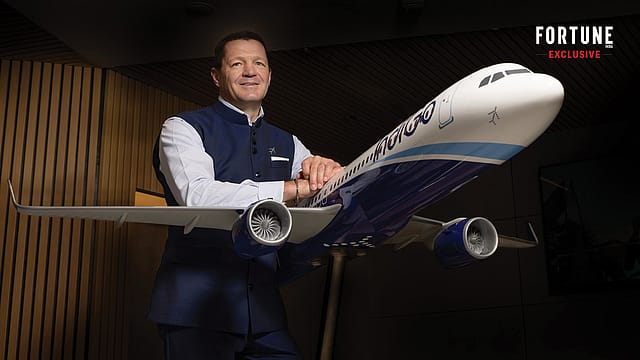Exclusive: Consolidation will help Indian airlines compete globally, says IndiGo CEO Pieter Elbers
ADVERTISEMENT

IndiGo CEO Pieter Elbers believes that the consolidation in India’s domestic aviation industry guarantees stability and continuity—the two key prerequisites to compete internationally.
“Where we are today is basically a situation which is not unlike some other parts of the world: with two larger airlines and a couple of relatively new young contenders. From a domestic market perspective, that’s probably a more stable setting. With a more stable setting, more continuity is being guaranteed,” Elbers, the CEO of India’s biggest carrier, told Fortune India in an interview.
India’s highly competitive airline industry has seen consolidation after low-cost carrier GoFirst went bankrupt in 2023. Since then, some players have faced liquidity issues while others are operating at a sub-optimal level.
India's largest carrier IndiGo corners nearly two-thirds of the domestic market while Tata Group-owned Air India comes second with roughly a quarter of the total market share. Akasa Air and SpiceJet account for 4% and 3% of the domestic market share, respectively.
The IndiGo CEO pointed out that India needs airlines of a "certain size and scale" to become an aviation hub. “One could argue that it’s good to have 15 different airlines and cut-throat competition, but if we want to build India into a global aviation hub, we should have great airlines, great infrastructure, great policies and great transfer facilities,” said Elbers.
“To make India a global aviation giant, you need to have airlines of a size. If we want to compete with the likes of Singapore Airlines and Emirates, we cannot be a domestic Indian airline,” he added.
India is surrounded by hubs like Dubai, Abu Dhabi and Qatar (Doha) on its West and Singapore and Hong Kong on its East that are waiting to take connecting traffic from India, said Elbers.
The IndiGo CEO also said that the cycle of airlines coming up and going bust has been much faster in India than in other parts of the world. “It is perhaps due to the value consciousness, price sensitiveness, and strong competition,” he said.
From a financial health point of view, the consolidation in the aviation sector should be good news for the industry overall, which has been beset with many challenges, said Shamsher Dewan, Senior Vice President and Group Head, Corporate Ratings, ICRA.
“This is one industry which has seen the highest number of bankruptcies globally. Consolidation should help as it has helped in global markets,” said Dewan.
The Tata group merged its two full-service carriers—Air India and Vistara—late last year. This followed the merger of the conglomerate’s low-cost airlines Air India Express and AIX Connect (formerly Air Asia India) in October 2024. Air India Group currently operates a combined fleet of 300 aircraft compared with IndiGo’s fleet of over 400 aircraft.
The consolidation in India’s aviation sector is also aiding airlines’ pricing power. “The pricing power has come back to some extent. The overall financial performance is much better. Demand has continued to remain fairly strong but supply hasn’t. Supply has actually gone out of the market after GoAir went bankrupt and SpiceJet gave away many of its aircraft because of liquidity issues,” Dewan explained. IndiGo, too, has over 40 aircraft on the ground due to Pratt & Whitney engine issues.
However, supply constraints have resulted in higher airfares for passengers as airlines continue to face delayed deliveries from aircraft makers.
The IndiGo CEO is of the opinion that there should be a correlation between ticket prices and costs. “We buy the same planes as other parts of the world. We buy the same fuel. We have the same maintenance. Over time, there should be a correlation between prices and costs. If there is no correlation, companies are out of business. That’s what we have seen too much in India in the past,” warned Elbers.